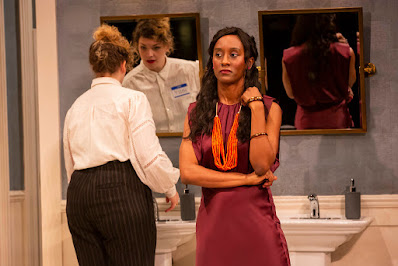IRT presents 'Mrs. Harrison': Two women reconnect across a racial and proprietary divide
 |
| 'Mrs. Harrison': Classmates' encounter reflects uneasiness from the start. |
The great American literary critic Lionel Trilling somewhere observed that we are read by the books we read.
He was presumably talking about the great novels upon which he focused his best work. The statement, typical of Trilling's moral earnestness, can readily be applied to the plays we see and the stories that are told to us. Both present us with narratives, imaginatively peopled, in a linear form that we process over time.
And if we are somehow read, or seen, by such art, it must mean more than a recognition that we sympathize with one or more characters, or find that the story strikes deep. It must mean that what is being presented is interpreting our lives in some way, that we are the object of some scrutiny instead of being just a witness, however sympathetic. We end up with a version of ourselves that we perhaps had never acknowledged. What we stake out as essential to our experience may not be the whole story, we learn.
In "Mrs. Harrison," the new two-character show that Indiana Repertory Theatre is live streaming through May 30, the cumulative weight of R. Eric Thomas' play is that similar, but crucially different, stories close to the characters are working upon each woman. It's clear as well from even the brief summary that IRT offers potential patrons that a serious discrepancy about the significance of life material that both characters lay claim to will emerge.
Holly, a white standup comic turned storyteller, is struggling to keep more than a foothold in her profession. In career terms, she's ironically marginalized. Aisha, a black classmate who has found significant stature as a playwright, is comfortable but somewhat guarded about her established status. The women meet ten years after graduation at a class reunion. Holly wears her name tag; Aisha has not applied hers because her glamorous outfit is silk (costume designer: Alexis Carrie).
 |
| Laughter gets Holly and Aisha used to their reunion |
Thomas has cleverly placed the action in a setting where the real-time lack of an interruption is quite plausible: a well-appointed lounge for faculty women (designed for IRT by Regina Garcia) at their distinguished alma mater. Outside as rain patters down, the rest of the class is congregating, with predictable reunion awkwardness, under a tent.
Mikael Burke directs the show with a sure instinct for getting his actors past the girl talk and the occasionally tense probes Holly makes toward Aisha. When they were friends negotiating a fraught play-writing class, Holly once told Aisha a story that we learn has shaped every aspect of their relationship. We know that a confrontation with racial dynamics is going to surface, and it's explosive when it does. For a while, and thanks to the WFYI cameras' well-modulated use of close-ups, midway perspectives, and full-stage views, we see a spellbinding spectrum of parry-and-thrust from Celeste M. Cooper as Aisha and Mary Williamson as Holly.
At first, I wondered if Williamson was playing Holly as too much a collection of attitudes and gestures, hairtrigger mimicry and self-justification, and if Cooper was overemphasizing a blithe self-consciousness displayed largely by protective giggling and a rising celebrity's studied presentation of casualness. It turned out these suggestions of hyperbole are just right for the roles. The audience is willy-nilly confronted with questions of who's telling the truth: Why is there such an edge to Holly's professed admiration for Aisha's work? Why does Aisha seem so forgetful or evasive about their faded friendship?
Maybe the play is reading us all along. I'm skeptical of the ability of any American playgoer to be absolutely color-blind when a bi-racial show doesn't seem to focus on race — at least, like "Mrs. Harrison," not right away. Thomas plays skillfully with this kind of resistance. An audience's response to Holly's and Aisha's dishy career talk is bound to be colored (pun deliberate) by the characters' identities.
The performances travel this varied terrain — part pasture, part minefield — most capably. "Mrs. Harrison" perhaps entices us to examine whether the stories that we feel define us are entirely genuine. Studies have shown that we tend to revise even our strongest memories each time we recall them, especially when we share them with others. Interpretation becomes part of whatever the experience "really" was.
Don't be surprised if you find yourself read by "Mrs. Harrison" almost as much as Holly and Aisha are read by their overlapping, clashing stories.
[Photos by Zach Rosing]



Comments
Post a Comment